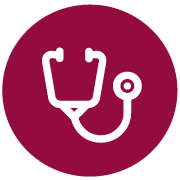 Rehabilitation
Rehabilitation
REHABILITATION
Rehabilitation is a process whereby you are assisted to relearn or find new ways of doing activities or functions lost as a result of the Stroke. A team of health professionals works with you to assist you to reach your maximum level of functioning.
Rehabilitation may take place in a variety of settings.
There are various models of rehabilitation utilised in NSW hospitals. Your rehabilitation will begin as soon as you are medically stabilised. Rehabilitation will occur in one of the following settings:
- Rehabilitation services located within the Stroke unit
- A rehabilitation setting within the same hospital but in another ward
- A specialist rehabilitation hospital
- A private hospital that specialises in rehabilitation
- Rehabilitation in the community
- Outpatients’ rehabilitation.
It is important to remember that rehabilitation is very different from being “treated” in hospital (acute care) and convalescent or nursing home care. In a rehabilitation setting, you are not considered medically ill so do not need further hospitalisation to “get better”. This is when your recovery from Stroke becomes a great deal harder.
The philosophy of rehabilitation is to maximise your independence. This is achieved through goal setting, which you direct with guidance from the specialised allied health staff.
Your clinicians hold regular case conferences to update all team members on your progress in regard to your goals. It is important to know when these occur and for you and your family to have input in to these discussions.
In rehabilitation, it is expected that:
- You are encouraged to be much more involved in your treatment.
- You are encouraged to do as much for yourself as you can safely do.
- You are expected to actively participate in therapies and other activities.
- Rest periods may be shorter than you are used to in the acute hospital.
- You may also eat your meals in the main dining room.
Highly trained medical, nursing and allied health staff work closely with you, your family and friends.
Length of stay
Rehabilitation begins while you are in the acute hospital or Stroke unit and continues after you go home, taking place over months and even years. There may be changes in your functioning over time; sometimes these changes will happen quite fast, other times they may happen very slowly. Each person progresses through rehabilitation at his or her own pace. You may not regain all of the abilities you hope to, and your rehabilitation may continue after discharge, either at home or via outpatient treatment.
Your stay in a specialist rehabilitation centre will depend primarily on how you progress with your recovery. Staff will meet with you and your family at regular intervals to discuss your discharge options. Your stay may be longer or shorter than the average, as everyone makes progress at his or her own pace.
Recovery
It is important that you take an active role in therapy and rehabilitation by:
- Keeping track of your daily schedule and attending therapies and meetings on time. In most rehabilitation hospitals, appointments are listed on a weekly timetable. Remember to keep track of the time of your appointment and who you saw each day.
- Working towards increasing your independence by using the skills you have learnt in therapy in your daily routine.
- Practising some exercises in your own time if your therapist suggests that you should do so. This is an area where your family and carer can become more actively involved. Knowledge of daily exercises is important, as you may want to continue them when you go home.
- Raising any concerns or problems you may have with the relevant therapist, or the nurse unit manager.
It is difficult to provide definite answers about your expected progress in rehabilitation and the likely outcomes as each person’s pattern of injury or illness and potential for recovery is different. No one wants to take away hope or give unrealistic expectations. The best solution is to work on improving the functions you currently have and evaluate your progress regularly.
It is important for all members of the family to be informed and involved in all aspects of treatment. On admission to a rehabilitation facility, you are assigned a team of health professionals who are primarily responsible for your therapy, treatment, education and discharge. This team may include a nurse, doctor, dietician, occupational therapist, physiotherapist, psychologist, recreation therapist, social worker and/or speech pathologist.
It is important to have a single person to be a point of contact about your rehabilitation program.
© Stroke Recovery Association NSW 2023
